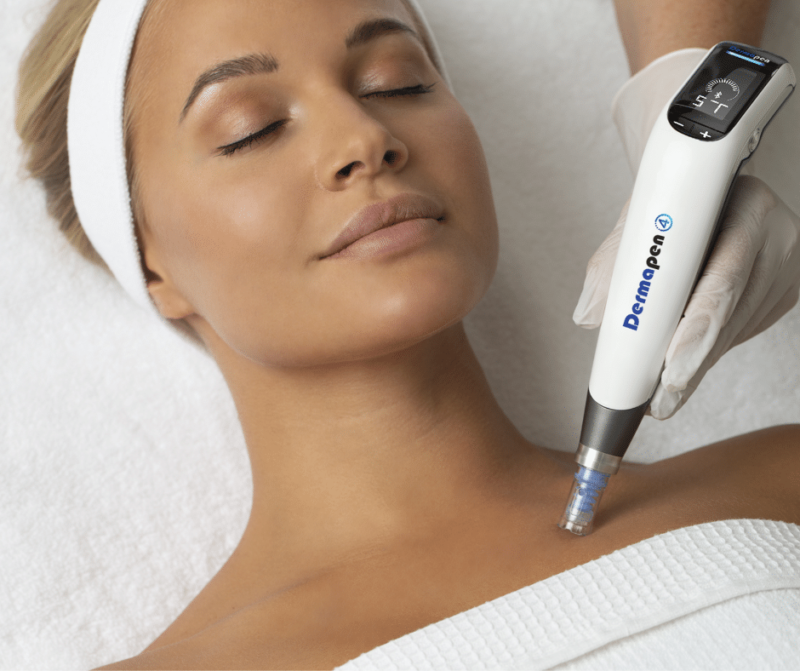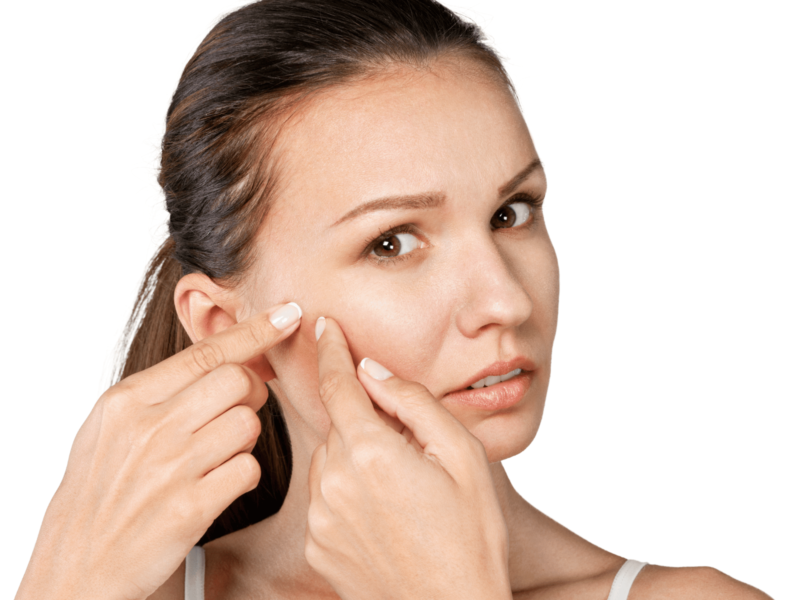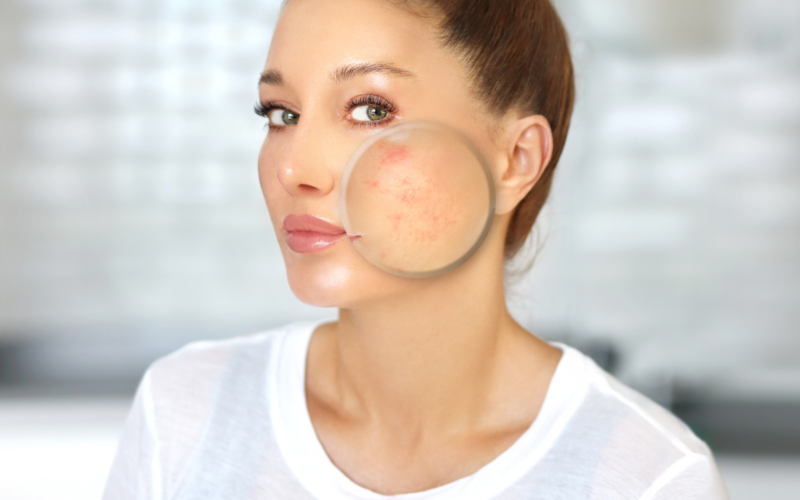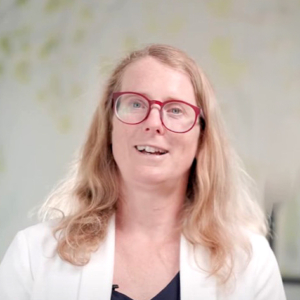Microneedling for acne scars in Christchurch
If you are looking for a microneedling expert in Christchurch, wait no longer. Dr Nadja Haub is an experienced cosmetic doctor with detailed knowledge of a wide range of skin conditions including acne. She performs medical microneedling with the Dermapen 4 device only. This device has got a proven safety record and has special features to treat acne scars.
- Be in safe hands with a qualified doctor
- Feel confident that we give you honest advice about how to best treat your acne scars
- Treat your acne scars with the best microneedling device currently available
- We only use dermapen accredited products for your skin
- High hygiene and safety standards
Acne scars can be a significant source of distress for those who suffer from them. They can negatively impact one’s self-esteem and confidence, making it difficult to feel comfortable in one’s skin. While there are numerous treatments available for acne scars, one treatment that has gained popularity in recent years is microneedling. In this blog, we will explore what microneedling is, how it works, and its effectiveness in treating acne scars.
What is Microneedling?
Microneedling is a minimally invasive cosmetic procedure that involves puncturing the skin with hundreds of tiny needles. The needles create micro-injuries in the skin. These small injuries need to heal. As the skin heals, it produces new collagen and elastin, which improves the skin’s texture, tone, and overall appearance.
Microneedling can be performed using a variety of devices. This varies from dermarolling which you can do at home to in-clinic treatments with highly sophisticated and more powerful devices such as the Dermapen 4. The depth and size of the needles can be adjusted to target specific areas of the skin.

How does Microneedling work for Acne Scars?
Acne scars form after a pimple or spot can cause a lot of inflammation in the skin. As a result, the skin in these highly inflamed areas sometimes does not heal smoothly but forms scars. For some reason, some people tend to get more and deeper acne scars compared to others. Some research indicates that this may be caused by genetic factors but we also know that sugar-rich foods and milk products make people a lot more prone to get acne and acne scars. Especially chocolate is well-known for causing acne.
Microneedling uses hundreds of fine needles that loosen the scar tissue underneath the acne scar. Because the tiny needle injuries are spread out so evenly, the skin will heal more smoothly and even out the scars. The tiny injuries also stimulate a special type of collagen (collagen type 3) which makes skin look smoother and healthier.
On top of that, microneedling creates tiny channels in the skin, which can improve the absorption of topical skincare products. This means that products like vitamin C serum or hyaluronic acid can penetrate deeper into the skin and nourish it from within.
Is Microneedling Effective for Acne Scars?
Studies have shown that microneedling can be an effective treatment for acne scars. A 2018 review of the literature found that microneedling improved the appearance of acne scars in 80% of patients. Another study published in the Journal of Cutaneous and Aesthetic Surgery found that microneedling was effective in reducing the severity of acne scars.
However, it’s important to note that microneedling may not work for everyone. The effectiveness of the treatment can depend on the severity and type of acne scars, as well as individual skin characteristics. It’s important to consult with a qualified healthcare provider to determine if microneedling is the right treatment for you.

What happens during the microneedling procedure?
The treatment is really quite fast, simple and effective. It typically lasts 30 minutes, more or less. Here is a brief description of the procedure:
- The process begins with cleaning the skin.
- If you are concerned that the procedure may be too uncomfortable, you may want to ask for a numbing cream.
- The Dermapen 4 microneedling pen is then gently rolled or stamped over the skin, creating microscopic channels or punctures in the outermost layer of the skin called the epidermis.
- These micro-injuries stimulate the skin’s natural healing response, triggering the production of collagen and elastin to repair and regenerate the skin.
- After this, we apply a special product that drifts along the tiny microchannels and deeply nourishes the skin from within.
- Once the procedure is over, the skin may appear red, swollen, or mildly bruised for a few days, but these side effects typically subside within a week.
How many microneedling sessions do I need for acne scars?
You may need multiple sessions of microneedling spaced several weeks apart to achieve the desired results. Most people have 3 microneedling sessions one month apart and some people have six of those sessions. After that, the majority of people maintain their treatment results every 6 to 12 months.
It is particularly important that you use good and high-quality skincare in between microneedling sessions. This should include a vitamin A (retinol) and vitamin B (niacinamide) cream and the occasional at-home peel. These two ingredients can help to regulate sebum production, which can help to prevent future breakouts. On top of that, you should also have regular at-home or in-clinic peels. This helps to further reduce acne outbreaks and restores radiance to your skin.

Is Microneedling for acne scars permanent?
Once you successfully treated your acne scars, they will not come back. But if your skin continues to have acne breakout, new scars can form and they will require additional treatment sessions.
Dr Nadja Haub says
Microneedling is a popular and effective treatment to improve acne scars. But some people get new acne break outs after their treatment and develop new scars. If this is the case, you may need to have additional microneedling sessions to get on top of these new scars. The good news is that the old scars that we treated will not come back but the skin will stay the same.
Please also keep in mind that it is essential to undergo microneedling treatment with a licensed and trained professional. Microneedling at home or with untrained professionals can lead to infection, scarring, or other adverse effects.
What types of acne scars can you get?
Acne scars are a common skin concern that can be caused by inflammatory acne. There are several types of acne scars, and each type has a unique appearance and treatment approach. The different types of acne scars include:
- Ice pick scars: These scars are small, deep, and narrow, and they have a jagged edge. They resemble small, deep holes in the skin and are usually caused by severe acne.
- Boxcar scars: These scars are wider and more shallow than ice pick scars. They have a rectangular shape with defined edges and are usually caused by inflammatory acne.
- Rolling scars: These scars have a wavy, rolling appearance and are caused by damage to the skin’s subcutaneous tissue. They can be shallow or deep and can cause an uneven texture on the skin.
- Hypertrophic scars: These scars are raised and bumpy and are caused by an overproduction of collagen during the healing process. They can occur anywhere on the body, but they are most commonly found on the chest, shoulders, and back.
- Keloid scars: These scars are similar to hypertrophic scars but extend beyond the boundary of the original wound. They are raised, bumpy, and often larger than the original wound.
Additionally, the severity of the acne scars and the individual’s skin type can also impact the effectiveness of microneedling. In some cases, multiple treatments may be necessary to achieve the desired results, and maintenance treatments may be needed to maintain the improvement.

What is the difference between microneedling and dermarolling?
Dermarolling is also known as microneedling at home. It is a similar treatment to microneedling, but it is performed using a handheld device called a dermaroller. The dermaroller consists of a handle and a roller with tiny needles and you can manually roll it over your skin. Like microneedling, dermarolling creates micro-injuries in the skin that stimulate the natural healing process.
However, it is important to note that the needles on dermarollers are typically shorter and less sharp than those used in professional microneedling devices. This means that dermarolling may not be as effective as microneedling performed by a skincare professional.
While microneedling and dermarolling are similar treatments, there are some key differences between the two:
- Device Used: The most obvious difference between the two treatments is the device used. Microneedling is performed using a professional-grade microneedling pen, while dermarolling is done using a handheld dermaroller.
- Needle Size and Sharpness: Microneedling devices typically have longer and sharper needles than dermarollers, which allows for deeper penetration into the skin. This can lead to more dramatic results.
- Treatment Depth: Microneedling devices allow skincare professionals to adjust the depth of the needles, which can be customized to each patient’s specific skin condition and concerns. Dermarollers, on the other hand, typically have fixed needle lengths and depths.
- Treatment Efficacy: Because microneedling devices are typically more advanced and have longer and sharper needles than dermarollers, they can be more effective in treating certain skin conditions such as acne scars.
Which Treatment is Right for You?
If you have more severe skin issues, such as deeper acne scars or deeper wrinkles, microneedling may be the best option for you. It provides faster and more dramatic results, especially for acne scars.
On the other hand, if you have mild skin concerns or prefer to perform treatments at home, dermarolling may be a good option for you. Dermarolling can be a cost-effective way to maintain healthy, youthful-looking skin, for example after you had microneedling in the clinic.

Conclusion
Microneedling is a popular and effective treatment for acne scars but it is important that you get this treatment from a qualified doctor or nurse. If you are looking for a microneedling expert in Christchurch, contact Dr Nadja Haub at Satini Cosmetic Clinic. She has performed many microneedling procedures for acne scars and will give you honest and safe advice on what’s best for your skin.
 7 Role of Microneedling in Atrophic Post-Acne Scars: An Experience from a Tertiary Care Hospital.
7 Role of Microneedling in Atrophic Post-Acne Scars: An Experience from a Tertiary Care Hospital.

